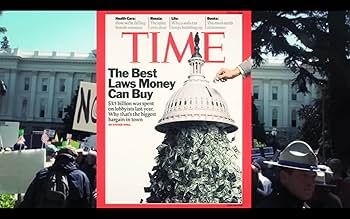A feature length documentary work which presents a case for a needed transition out of the current socioeconomic monetary paradigm which governs the entire world society.A feature length documentary work which presents a case for a needed transition out of the current socioeconomic monetary paradigm which governs the entire world society.A feature length documentary work which presents a case for a needed transition out of the current socioeconomic monetary paradigm which governs the entire world society.
- Awards
- 1 win & 1 nomination total
Peter Joseph
- Narrator
- (voice)
- …
Toni Orans
- Animation Voices
- (voice)
- Director
- Writer
- All cast & crew
- Production, box office & more at IMDbPro
Featured reviews
this film is life-changing and hopefully world-changing.
filmmaker Peter Joseph has created a must-see documentary that doesn't only analyze the main problems in the world in a never-before-seen way, but also offers a real solution.
there's no more "conspiracy theory" type information in this film, as used to be in the first ZEITGEIST.
this is a profound, professional, scientific work of genius.
if you ever watch a documentary, watch this.
spread this movie wherever you can, this information needs to reach everyone in the world.
filmmaker Peter Joseph has created a must-see documentary that doesn't only analyze the main problems in the world in a never-before-seen way, but also offers a real solution.
there's no more "conspiracy theory" type information in this film, as used to be in the first ZEITGEIST.
this is a profound, professional, scientific work of genius.
if you ever watch a documentary, watch this.
spread this movie wherever you can, this information needs to reach everyone in the world.
I've very much enjoyed the previous films in the series. However their presentation was somehow more conspiracy-theory feeling, even though most of the facts, and ideas in them I found compelling in one way or another. Talking about specific popular religions falsehoods and origins, or government collusion with the events of 9/11 for example were ideas quite abhorrent to some people.
I'm glad to say that's not the tone or message you get from The newest Zeitgeist film. You can take a religious minded friend or patriot to see this, or link them the URL when it's released without fearing they will be offended.(affected? Perhaps....)
It is because of this much more purely documentary style presentation, that allows it to be less confrontational, and much more cognitive and effective at presenting it's message, This movie shines in comparison, and firmly takes itself out of any conspiracy theory labeling. I will also say that you can truly see a significant change in both mindset and skill set in the producer Peter Josephs work since the original films release in 2007. This film will find far more resonance with a far larger audience.
The film is long. It runs 2:40+ mins. Oh gosh, plus it a documentary, so no doubt your expecting to get bored along the way, but I assure you the subject matter they discuss is quite intense in it's own way, and you will be compelled to continue watching it in fascination until the very end.
I'm glad to say that's not the tone or message you get from The newest Zeitgeist film. You can take a religious minded friend or patriot to see this, or link them the URL when it's released without fearing they will be offended.(affected? Perhaps....)
It is because of this much more purely documentary style presentation, that allows it to be less confrontational, and much more cognitive and effective at presenting it's message, This movie shines in comparison, and firmly takes itself out of any conspiracy theory labeling. I will also say that you can truly see a significant change in both mindset and skill set in the producer Peter Josephs work since the original films release in 2007. This film will find far more resonance with a far larger audience.
The film is long. It runs 2:40+ mins. Oh gosh, plus it a documentary, so no doubt your expecting to get bored along the way, but I assure you the subject matter they discuss is quite intense in it's own way, and you will be compelled to continue watching it in fascination until the very end.
A fascinating insight into the underlying causes of many of the world's problems. The solution Z proposes is flawed, although a sound basis for further thought.
The most powerful flaw with this new society is how people are motivated to strive and improve. If everyone gets their fair share, what is the motivation to toil in difficult jobs that will never be made redundant such as the sciences, computing, or robotics? An individual's life can never be better than his neighbour's. So is societal gain from your endevours enough of an incentive to spend your life toiling in a science lab rather than do less challenging work? Given the choice, most people would choose an easy life.
Secondly, the natural conclusion of this new society is Gattaca. The first half hour of Z explains that criminals, addicts, etc are more a product of their environment than genetically predisposed. By removing the bad environment so the argument goes - poverty, poor education, healthcare, inequality, etc, the conditions that create problematic people are removed. Sounds plausible. However would such a society not then place far more emphasis on the quality of your genes? Environment and cause & effect would no longer be factors, everyone would receive good upbringings. The distinguishing factor would be genetic. And that essentially is the dystopia depicted in Gattaca (an excellent film btw).
To those who say this solution is communist, which has been tried and failed - this solution is not communist. It is post-communist. With the power of modern computers, the efficient resource-allocation system could be operated on a decent-spec home computer. The reason communism kept failing is that it inevitably led to a corrupt elite who were rightfully deposed by popular uprising. If everyone can duplicate the system on which resources are allocated themselves on their own computers, there can be no accusation of corruption. There would be healthy debate and democratic decision making as to the rules and inputs to the system, but there would be no elitist subversion of the planned economy that people hated so much about communism (nor capitalism's elite 1% owning 40%).
So in summary, not the definitive blueprint it wants to be, but food for thought nevertheless.
The most powerful flaw with this new society is how people are motivated to strive and improve. If everyone gets their fair share, what is the motivation to toil in difficult jobs that will never be made redundant such as the sciences, computing, or robotics? An individual's life can never be better than his neighbour's. So is societal gain from your endevours enough of an incentive to spend your life toiling in a science lab rather than do less challenging work? Given the choice, most people would choose an easy life.
Secondly, the natural conclusion of this new society is Gattaca. The first half hour of Z explains that criminals, addicts, etc are more a product of their environment than genetically predisposed. By removing the bad environment so the argument goes - poverty, poor education, healthcare, inequality, etc, the conditions that create problematic people are removed. Sounds plausible. However would such a society not then place far more emphasis on the quality of your genes? Environment and cause & effect would no longer be factors, everyone would receive good upbringings. The distinguishing factor would be genetic. And that essentially is the dystopia depicted in Gattaca (an excellent film btw).
To those who say this solution is communist, which has been tried and failed - this solution is not communist. It is post-communist. With the power of modern computers, the efficient resource-allocation system could be operated on a decent-spec home computer. The reason communism kept failing is that it inevitably led to a corrupt elite who were rightfully deposed by popular uprising. If everyone can duplicate the system on which resources are allocated themselves on their own computers, there can be no accusation of corruption. There would be healthy debate and democratic decision making as to the rules and inputs to the system, but there would be no elitist subversion of the planned economy that people hated so much about communism (nor capitalism's elite 1% owning 40%).
So in summary, not the definitive blueprint it wants to be, but food for thought nevertheless.
This was definitely the best, in both visual effects and quality of content, out of the Zeitgeist series. A few animated shorts provide welcomed comic relief throughout the 2-hour and 40-minute film.
As a sociologist, I particularly appreciated the first half of the movie which was dedicated to discussing human "nature", behavior, and social pathology.
With the basic groundwork laid for understanding how humans *do* have the potential to create a massive shift in our current social/cultural paradigm, the film goes on to offer the potential design and physical layout of a more efficiently functioning social system.
Anyone who is concerned with the current state of our global society should watch this film... and then share it with a friend. (And anyone who's not concerned with the current state of our global society should probably read about international news more often.)
As a sociologist, I particularly appreciated the first half of the movie which was dedicated to discussing human "nature", behavior, and social pathology.
With the basic groundwork laid for understanding how humans *do* have the potential to create a massive shift in our current social/cultural paradigm, the film goes on to offer the potential design and physical layout of a more efficiently functioning social system.
Anyone who is concerned with the current state of our global society should watch this film... and then share it with a friend. (And anyone who's not concerned with the current state of our global society should probably read about international news more often.)
The filmmaker, Peter Joseph, gathered up some of the best scientists in their respective fields (along with Michael Ruppert, of "Collapse" fame) to present a case for a near-empirical way of dealing with the problems of society.
Any fan of science over opinion, evidence over belief or challenging the status quo in general will find much to love here.
It is seemingly thought of as a political documentary, but technically, there is nothing "political" about it. It takes no sides in the establishment, basing its solutions on evidence (and the scientific method, in a general sense).
This comes off as a radical approach to problems, only because we don't see that in politics. But as far as radical notions go, what Zeitgeist : Moving Forward presents doesn't seem "out there" at all. But the ideas here are really quite universal. They exist in every culture or religion as "goals" or things to work towards. But until now, a clear case hasn't been presented on how to actually get there - how to solve the problems by taking them into account from the beginning.
Strong societies require strong foundations - and not a country in the world currently has a foundation like that.
Any fan of science over opinion, evidence over belief or challenging the status quo in general will find much to love here.
It is seemingly thought of as a political documentary, but technically, there is nothing "political" about it. It takes no sides in the establishment, basing its solutions on evidence (and the scientific method, in a general sense).
This comes off as a radical approach to problems, only because we don't see that in politics. But as far as radical notions go, what Zeitgeist : Moving Forward presents doesn't seem "out there" at all. But the ideas here are really quite universal. They exist in every culture or religion as "goals" or things to work towards. But until now, a clear case hasn't been presented on how to actually get there - how to solve the problems by taking them into account from the beginning.
Strong societies require strong foundations - and not a country in the world currently has a foundation like that.
Did you know
- Quotes
Jacque Fresco: I'm 94 years old now, and I'm afraid my disposition is the same as it was 75 years ago: This $hit's got to go!
- ConnectionsFollowed by Interreflections (2020)
- How long is Zeitgeist: Moving Forward?Powered by Alexa
Details
- Release date
- Country of origin
- Official sites
- Language
- Also known as
- Дух времени: Следующий шаг
- Production company
- See more company credits at IMDbPro
Box office
- Budget
- $200,000 (estimated)
- Runtime
- 2h 41m(161 min)
- Color
- Sound mix
- Aspect ratio
- 16:9 HD
Contribute to this page
Suggest an edit or add missing content




















